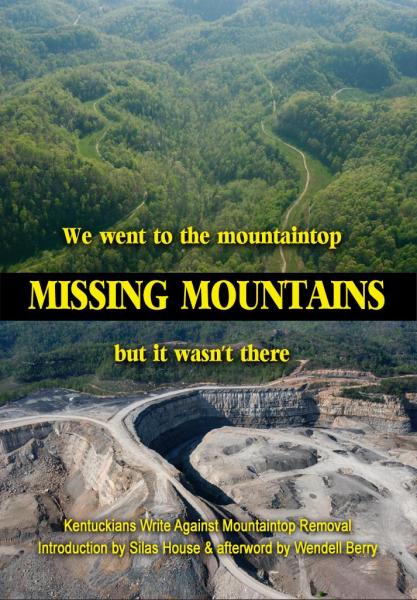Missing Mountains
"Missing Mountains . . . testimony, short story, poem and essay, is a model of engaged witnessing – art in service of community. It is the opposite of public relations – it is truth telling."
Bill McKibben
in The Christian Century
Contributors
Authors contributing to this volume are:
- Whitney Baker
- Artie Ann Bates
- Wendell Berry
- George Brosi
- Steven R. Cope
- Tony Crunk
- Charles Bracelen Flood
- Lucy Flood
- Stephen George
- Jerry Hardt
- Chris Holbrook
- Silas House
- Charlie Hughes
- Kristin Johannsen
- Loyal Jones
- Leatha Kendrick
- Christina E. Lovin
- George Ella Lyon
- Maurice Manning
- Bobbie Ann Mason
- Ed McClanahan
- Davis McCombs
- Amanda Moore
- Daymon Morgan
- Gurney Norman
- Erik Reece
- Susan Starr Richards
- Gwyn Hyman Rubio
- Anne Shelby
- Bob Sloan
- Pauline Stacy
- Richard Taylor
- Mary Ann Taylor-Hall
- Betty Wood
- Jeff Worley
With photographs by:
- Geoff Oliver Bugbee
- Warren Brunner
- Ann Olson
 We went to the mountaintop but it wasn't there
We went to the mountaintop but it wasn't there
Introduction by Silas House
Afterword by Wendell Berry
edited by Kristin Johannsen, Bobbie Ann Mason and Mary Ann Taylor-Hall
Published by Wind Publications, Nicholasville, Kentucky, October 2005
Kentuckians write against mountaintop removal mining in this book which was inspired by the April 2005 Kentucky Authors Mountaintop Removal Tour organized by KFTC.
Readers often look at the word 'environment' and automatically think of streams, trees, mountains. But an environment is also made up of people. This is a collection of writing that remembers the children who do not have good water to drink or bathe in, the people who travel unsafe roads or live beneath sites that have already sent boulders crashing through their homes. This book calls to account a government that prefers to produce coal for our energy-consuming nation in the quickest, cheapest way, rather than to find a safe, more efficient and respectful method, one which would also create jobs for the region.
-Silas House
For 130 years now, we've been told over and over again that coal is good for Kentucky, but the numbers tell a different story. More than 7.8 billion tons of coal have been mined here in that time. But despite the extraction of vast mineral wealth from our land, Kentucky continues its uphill struggle to provide a decent living, a good education, and a clean environment for its people. And the counties of the eastern coalfields, with the richest natural resources of all, remain among the poorest in the entire state.
-Kristin Johannsen
Eastern Kentucky, in its natural endowments of timber and minerals, is the wealthiest region of our state, and it has now experienced more than a century of intense corporate 'free enterprise,' with the result that it is more impoverished and has suffered more ecological damage than any other region. The worst inflicter of poverty and ecological damage has been the coal industry, which has taken from the region a wealth probably incalculable, and has imposed the highest and most burdening 'costs of production' upon the land and the people. Many of these costs are, in the nature of things, not repayable. Some were paid by people now dead and beyond the reach of compensation. Some are scars on the land that will not be healed in any length of time imaginable by humans.
-Wendell Berry
- Home
- |
- Sitemap
- |
- Get Involved
- |
- Privacy Policy
- |
- Press
- |
- About
- |
- Bill Tracker
- |
- Contact
- |
- Links
- |
- RSS

